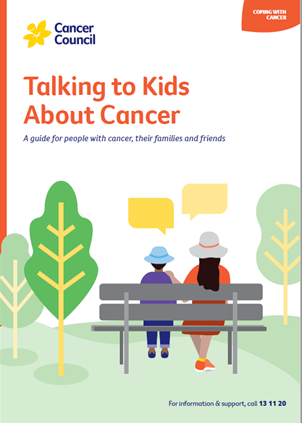- Home
- About Cancer
- Family and friends
- Talking to kids about cancer
- Talking about cancer
- How children understand cancer
How children understand cancer
Children’s understanding of illness and their reactions to news of a cancer diagnosis will vary depending on their age, temperament and family experiences. You may find that siblings, even of similar ages, respond differently.
We give an overview of children’s possible reactions at different ages, which might help you work out how best to support them.
Learn about the different views of:
As children grow up, their understanding of the world will also develop. You may need to check in with them to see if they need more information about the cancer. Some children’s understanding of cancer may be set at the age at which they were first told. As they mature, they may become ready for more in-depth conversations.
Newborns, infants and toddlers (0-3 years)
Infants have little understanding of illness but may pick up on their parents’ anxiety and other feelings. They are aware of periods of separation from their parents and can get upset when a parent is not there. Toddlers may react to physical changes in their parent or relative (such as hair loss) or noticeable side effects (such as vomiting).
Possible reactions |
Suggested approaches |
|
newborns and infants:
toddlers:
|
|
Preschoolers (3-5 years)
By the age of 3, children have a basic understanding of illness. Younger children may believe that they caused the illness (e.g. by being naughty or thinking bad thoughts). They may also think they can catch cancer. It is natural for young children to think everything is related to them – Did I cause it? Can I catch it? Who will look after me? They may also express their concerns or feelings through imaginative play.
Possible reactions |
Suggested approaches |
|
|
Primary schoolchildren (5-12 years)
In the early primary school years, children have a basic understanding of sickness, and by later primary years, they are ready for more details about cancer. They may use simple cause-and-effect logic to fill gaps in their knowledge; for example, they sometimes feel that their bad behaviour might have caused the disease. They may understand that people, including parents, can die.
Possible reactions |
Suggested approaches |
|
|
Teenagers (12-18 years)
During adolescence, young people start to think more like adults. As their ability for abstract thought develops, they are able to understand complex cause-and-effect relationships, such as illness and symptoms. With increasing maturity, teenagers understand that people get sick, but are more likely to deny fear and worry to avoid discussions about these issues.
Possible reactions |
Suggested approaches |
|
|
→ READ MORE: Talking about the diagnosis
Podcast: Explaining Cancer to Kids
Listen to more episodes from our podcast for people affected by cancer
More resources
Prof Jane Turner AM, International Psycho-Oncology Society President Emeritus,The University of Queensland, QLD; Taylor Baker, Consumer; Dr Ben Britton, Principal Clinical and Health Psychologist, Head of Psychology, Hunter New England Mental Health, NSW; Camp Quality; Dr Lisa Cuddeford, Head of Department, WA Paediatric Palliative Care Service, Perth Children’s Hospital, WA; A/Prof Peter Downie, Head, Paediatric Haematology–Oncology and Director, Children’s Cancer Centre, Monash Children’s Hospital, VIC; Dr Sarah Ellis, Clinical Psychologist, Kids Cancer Centre, Sydney Children’s Hospital, NSW; Malia Emberson-Lafoa’i, Consumer; Kate Fernandez, 13 11 20 Consultant, Cancer Council SA; Jane Gillard, Consumer; Mary McGowan OAM, International Childhood Cancer Advocate, VIC; Annette Polizois, Senior Social Worker, Women, Family and Emergency Care Team, Royal North Shore Hospital, NSW; Rhondda Rytmeister, Clinical Psychologist, HeadWayHealth (formerly Snr Clinical Psychologist, The Cancer Centre for Children, Westmead, NSW); Nadine Street, Head of Social Work and Social Welfare, HNE Mental Health Service, NSW; Warren Summers, Online Counsellor, Canteen, NSW.
We would also like to thank the health professionals, consumers, organisations and editorial teams who have worked on previous editions of this title, and we are grateful to the parents and young people whose real-life stories have added to the richness and relevance of this book.
We thank and acknowledge Dr Paula K. Rauch, MD, Founder and Director, Marjorie E. Korff PACT (Parenting At a Challenging Time) Program and Associate Professor of Psychiatry, Harvard Medical School, whose research and writing on helping parents talk to their children about cancer was used as source material for this book and has been adapted in several sections: pages 8–11, How children understand cancer; page 22, Answering key questions: Are you going to die?; page 26, Involving the school or preschool; pages 30–31, Hospital visits; and pages 36–37, Encouraging family time. We also thank the American Cancer Society for permission to use and adapt material on pages 8-11 from its book Cancer in Our Family: Helping children cope with a parent’s illness (2013); Macmillan Cancer Support for permission to use its book Talking to Children and Teenagers When an Adult Has Cancer (2013) as a source of information; Jessica Watt, Oncology Social Worker, The Children’s Hospital at Westmead, for her contribution on page 20, When another child has cancer; and Diane McGeachy, Hobart Counselling Centre, for contributing material for page 37, Spending one-on-one time.
View the Cancer Council NSW editorial policy.
View all publications or call 13 11 20 for free printed copies.

